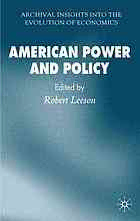
American power and policy PDF
Preview American power and policy
American Power and Policy This page intentionally left blank American Power and Policy Editedby Robert Leeson Selectionandeditorialmatter©RobertLeeson2009 Individualchapters©Contributors2009 Allrightsreserved.Noreproduction,copyortransmissionofthis publicationmaybemadewithoutwrittenpermission. Noportionofthispublicationmaybereproduced,copiedortransmitted savewithwrittenpermissionorinaccordancewiththeprovisionsofthe Copyright,DesignsandPatentsAct1988,orunderthetermsofanylicence permittinglimitedcopyingissuedbytheCopyrightLicensingAgency, SaffronHouse,6–10KirbyStreet,LondonEC1N8TS. Anypersonwhodoesanyunauthorizedactinrelationtothispublication maybeliabletocriminalprosecutionandcivilclaimsfordamages. Theauthorshaveassertedtheirrightstobeidentifiedastheauthorsof thisworkinaccordancewiththeCopyright,DesignsandPatentsAct1988. Firstpublished2009by PALGRAVEMACMILLAN PalgraveMacmillanintheUKisanimprintofMacmillanPublishersLimited, registeredinEngland,companynumber785998,ofHoundmills,Basingstoke, HampshireRG216XS. PalgraveMacmillanintheUSisadivisionofStMartin’sPressLLC, 175FifthAvenue,NewYork,NY10010. PalgraveMacmillanistheglobalacademicimprintoftheabovecompanies andhascompaniesandrepresentativesthroughouttheworld. Palgrave®andMacmillan®areregisteredtrademarksintheUnitedStates, theUnitedKingdom,Europeandothercountries. ISBN-13:978–1–4039–4956–1 hardback Thisbookisprintedonpapersuitableforrecyclingandmadefromfully managedandsustainedforestsources.Logging,pulpingandmanufacturing processesareexpectedtoconformtotheenvironmentalregulationsofthe countryoforigin. AcataloguerecordforthisbookisavailablefromtheBritishLibrary. AcatalogrecordforthisbookisavailablefromtheLibraryofCongress. 10 9 8 7 6 5 4 3 2 1 18 17 16 15 14 13 12 11 10 09 PrintedandboundinGreatBritainby CPIAntonyRowe,ChippenhamandEastbourne Contents NotesonContributors vii 1. Introduction 1 RobertLeeson 2. AmericanintheShadows:HarryDexterWhite andtheDesignoftheInternationalMonetaryFund 6 JamesM.Boughton 3. BuildingupaMultilateralStrategyfortheUnitedStates: AlvinHansen,JacobViner,andtheCouncilon ForeignRelations(1939–45) 24 SebastianoNerozzi 4. AHands-offCentralBanker?MarrinerS.Ecclesand theFederalReserve,1934–51 69 MatíasVernengo 5. TheGreatInflationofthe1970s:Evidencefrom theArchives 91 JohnLodewijksandRobertLeeson 6. AnArchivalCaseStudy:RevisitingTheLifeand PoliticalEconomyofLauchlinCurrie 105 RogerJ.Sandilands 7. NewEvidenceonAllynYoung’sStyleandInfluence asaTeacher 134 RogerJ.Sandilands 8. AScholarinActioninInterwarAmerica:JohnH.Williams onTradeTheoryandBrettonWoods 180 PierFrancescoAssoandLucaFiorito v vi Contents 9. ShapingMonetaryConstitutionsforDeveloping Countries:SomeArchivalEvidenceonthe BloomfieldMissionstoSouthKorea(1949–50) 243 MicheleAlacevichandPierFrancescoAsso NameIndex 267 SubjectIndex 274 Notes on Contributors MicheleAlacevich ResearchFellow DepartmentonPolitics,LawandSociety UniversityofPalermo [email protected] PierFrancescoAsso ProfessorofHistoryofEconomics UniversityofPalermo DepartmentofEuropeanStudiesandInternationalIntegration(DEMS) [email protected] JamesM.Boughton Historian DevelopmentandReviewDepartment InternationalMonetaryFund. [email protected] LucaFiorito AssociateProfessorofHistoryofEconomicThought UniversityofPalermo DepartmentonPolitics,LawandSociety [email protected] RobertLeeson VisitingFellow HooverInstitution StanfordUniversity AdjunctProfessorofEconomics NotreDameAustraliaUniversity [email protected] JohnLodewijks ProfessorofEconomicsandHeadofSchool UniversityofWesternSydney [email protected] vii viii NotesonContributors SebastianoNerozzi Researcher UniversityofPalermo DepartmentonPolitics,LawandSociety [email protected] RogerJ.Sandilands ProfessorofEconomics UniversityofStrathclyde [email protected] MatíasVernengo AssistantProfessorofEconomics UniversityofUtah [email protected] 1 Introduction Robert Leeson Having examined the structure of influence within the Keynesian and anti-Keynesiantraditions(volumes1and2intheseriesArchivalInsights intotheEvolutionofEconomics),thisvolumefocusesmoredirectlyon economistsandthepolicyprocess.Inthetwentiethcentury,theUnited StatesreplacedtheUnitedKingdomasthecenterofbothacademiceco- nomics and the international economy. In the process, the position of theUnitedStateswithregardtomultinationalbodieswastransformed: fromdecliningtobeinvolved(LeagueofNations,1920)tocollaborative construction(BrettonWoods,1944)toallthearroganceandanxietiesof solesuperpowerstatus. The chapters below highlight aspects of a multi-layered structure of influencewithinthepolicyprocess.Theyareprimarilyconcernedwith thenineeconomistsassociatedwiththebirthoftheInternationalMon- etary Fund (IMF) and the expanding influence (and independence) of theFederalReserveSystem:HarryDexterWhite,LauchlinCurrie,Alvin Hansen,JacobViner,MarrinerEccles,ArthurOkun,AllynAbbottYoung, JohnH.WilliamsandArthurBloomfield. The first six will be familiar to many non-economists. White’s plan underpinned the IMF; Currie was the first professional economist to work as a presidential adviser in the White House (a forerunner to the post-warpositionofchairofthePresident’sCouncilofEconomicAdvis- ers, CEA). Hansen and Viner (presidents of the American Economic Association, Hansen in 1938 and Viner in 1939) were influential lead- ersofcompetingschools(KeynesianandChicago,respectively).Eccles, the son of a rags-to-riches Mormon polygamist, was chair of the Fed (1935–48) during the period of the first stage of its (institutional) independencefromtheTreasury.Okun(afterwhomthe‘Okungap’–the 1
